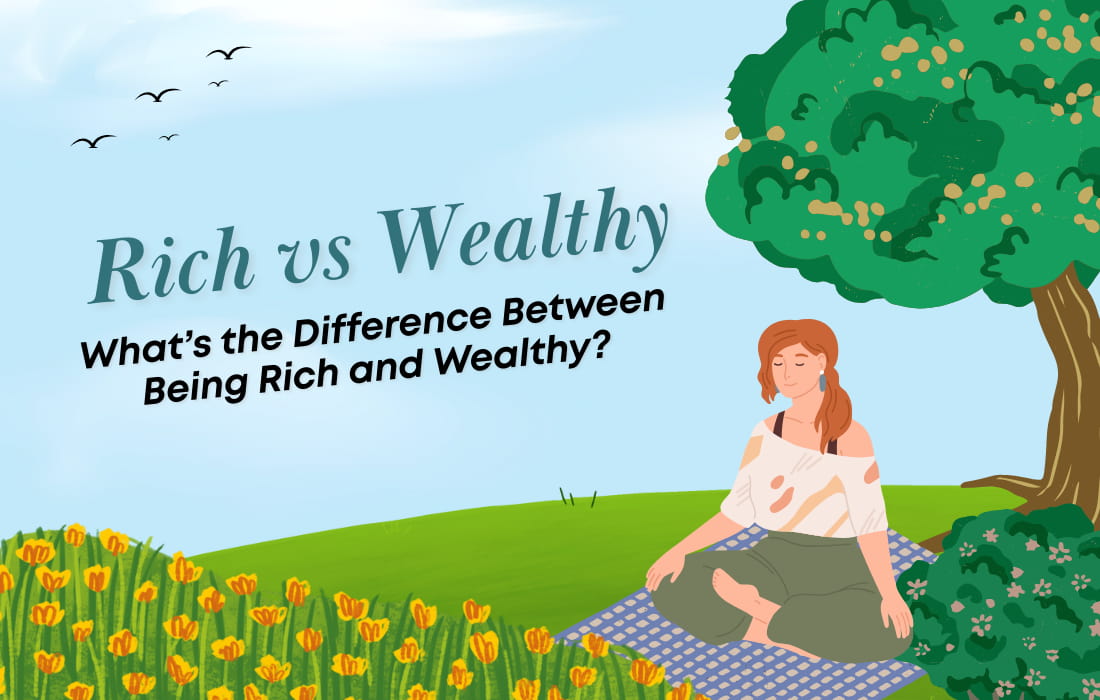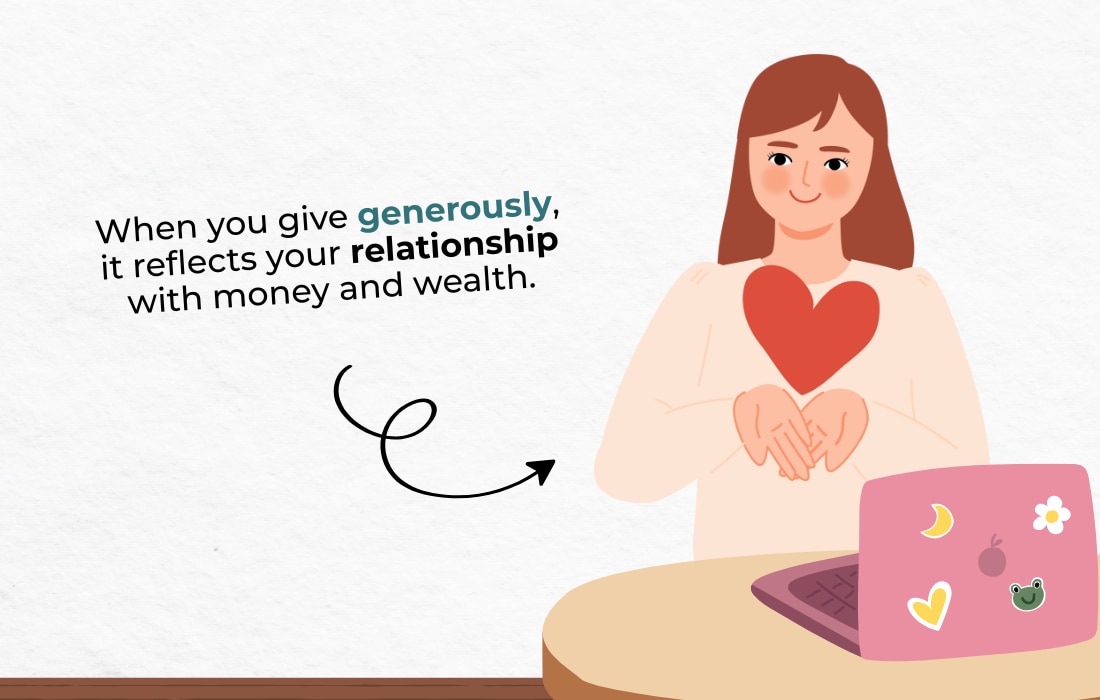What is the difference between being rich and wealthy?
Rich vs wealthy…what’s the difference?
Being rich typically means having a lot of money right now, while wealth is about long-term financial security and freedom.
Wealth includes assets, investments, and a healthy money mindset that supports growth over time. You can be rich without being truly wealthy if you constantly spend everything you earn.
The key difference between being rich vs wealthy comes down to sustainability, habits, and how you manage and build your money. As a financial advisor, I typically work with clients who are wealthy. They have good financial habits and have saved and invested their money over time.
Being rich can come and go, while being wealthy is for the long-term.
Written By Tiffany Woodfield, Financial Coach, TEP®, CRPC®, CIM®

🔑 Key Takeaways:
- Being rich is about having a lot of money in the present moment
- Being wealthy is about long-term financial security, freedom, and sustainability
- The rich often focus on spending and appearances, while the wealthy prioritize habits and values
- Wealth includes assets, investments, and strategies that build and protect money over time
- Richness can come and go quickly, while true wealth endures and supports lasting fulfillment
- Wealthy individuals use debt strategically and invest with a long-term, risk-aware mindset
- Wealth provides time freedom, allowing one to focus on experiences, relationships, and purpose
- True wealth emphasizes generosity, inner peace, and aligning money with personal values
Are you a rich person? Or are you a wealthy person?
Consider the example of a young boy in a candy store, exuberantly spending his birthday money.
He eagerly buys everything in sight, excited to show off his purchases to friends. In contrast, an older, quieter boy observes from the sidelines. He, too, has recently come into a sum of money, but keeps it to himself, thoughtfully adding it to his savings, knowing precisely how and when he wants to spend it.
This discerning individual understands the transient nature of wealth (even at his young age) and values stability over the fleeting reward of short-term status.
What Does It Mean to Be Rich?
Most people can notice rich people because of their lavish lifestyles and spending habits.
Being rich is visible. You can see it.
Rich people often have expensive cars, luxurious vacations, and wear designer clothing. To be rich typically means to focus on immediate satisfaction and gaining material possessions rather than creating lasting financial security.
However, true richness can only be measured by moments and experiences that wealth can buy over time. Wealth isn’t about instant success; it’s about the long-term.
What Does It Mean to Be Wealthy?
Wealthy individuals often possess a quiet confidence that distinguishes them from the more flashy displays of the rich.
While they may own expensive homes, luxury cars, and enjoy lavish vacations, they tend to avoid flaunting their possessions. Being wealthy means embodying a long-term perspective, grounded in the understanding that true freedom stems from a sense of inner peace and values that align with one’s core beliefs.

How Can I Start Building Wealth That Lasts?
To build wealth that lasts, it’s important to first understand your current financial situation—specifically, how much money comes in and goes out each month.
Be discerning about unnecessary expenses that don’t align with your values. Create both short- and long-term goals to give you a clear purpose for saving money, paying off debt, and becoming more financially savvy. Begin by putting a percentage of your income into a separate investment account, allowing it to compound and grow over time.
Work to generate income both passively and actively. And invest in your time and money in learning to strengthen your financial knowledge and skills.
How the Wealthy Use Debt Wisely
Wealthy individuals understand when and how to use debt to their advantage.
This means that if the cost of borrowing money is lower than the potential returns on that borrowed capital, they are, in effect, ahead of the game. Essentially, they profit from the spread between what they can borrow and what they can earn.
Moreover, wealthy individuals are acutely aware of the risks associated with debt. They carefully assess their cash flow needs before taking on any additional debt, ensuring they make informed decisions that align with their financial goals.
How the Wealthy Think About Investing
Wealthy individuals take a long-term approach to investing.
Rather than chasing short-term gains in the stock market, wealthy people focus on investing for the future, diversification, and acquiring quality companies. They recognize that get-rich-quick strategies are rarely effective and instead prioritize solid, sustainable investments.
Additionally, they understand the importance of tax-efficient investment tools, as they appreciate how taxes can erode their returns. They leverage strategies such as compounding, dividends, and tax-deferred accounts to maximize their wealth. In addition, they value working with financial advisors who provide both education and guidance to help them achieve their goals.
They don’t work with advisors who promise them the moon.
Instead, they work with advisors who balance building wealth with reducing risk. When you’ve built substantial wealth, the biggest risk is losing what you’ve worked so hard to build. So families with multi-generational wealth focus on risk mitigation just as much as they focus on building more wealth.

How Wealthy People Think about Money
Wealthy individuals view money as a tool that enables them to live fulfilling lives.
They don’t see money as the ultimate goal; instead, they focus on the experiences and the positive impact that having money can facilitate. They use their resources wisely, ensuring that their spending aligns with their vision and core values.
They invest consistently, generating both passive income and active income from business ventures.
They don’t earn money based on the number of hours they work in a day. And they prioritize financial education, work with a financial adviser, and invest time in understanding money management so they can make educated choices.
Rich people often think more short-term and tend to take higher risks.
While wealthy individuals are not risk-averse, they approach risk with calculation and strategy. They make informed decisions that support their long-term objectives.
How the Wealthy Think about Net Worth
Wealthy individuals view net worth as a measure of their ability to make choices and achieve financial freedom.
It is not meant to be seen as a means of comparison with their peers. For them, net worth is important because it instills confidence that both they and their families will be financially secure. Additionally, it provides a sense of assurance that their legacy and future generations will be protected long after they are no longer around.
Wealthy individuals actively work to grow their net worth through strategic investments and sound financial planning, reinforcing their commitment to achieving both personal and philanthropic goals.
While it’s true that not all wealthy people fit this mold, wealthy individuals generally have the opportunity to choose and be mindful of how they use their money. Ultimately, they understand that net worth is not just a number; it reflects their values and the impact they wish to have on the world.

Why Time Freedom Is The Ultimate Wealth
The one thing we can never seem to get enough of is time.
It’s not just about the quantity of time, but also the quality of it. Time spent with family and friends, doing the things you love.
Imagine if I could grant you one wish, what would you want? Think about it.
Was it enough money so you could do anything you want in life?
I remember asking one of my sons (who was 10 at the time) what he would wish for. I expected him to ask for the latest video game or a new bike. Instead, he paused for a moment, then said, “Let me think about it.” After a few moments, he said, “I wish for you, Dad, and my brother Carson to live as long as you want and to be happy and doing the things you love.”
I was dumbfounded because, unknowingly, he had captured the essence of life: having the time to do what you love.
This is the ultimate freedom. (And no, I had never expressed this idea to him before, nor would I have expected him to understand it at the age of 10.)
Time freedom allows you to pursue your passions, contribute to your communities, and cultivate meaningful relationships, making it an essential aspect of a fulfilling life.
Does Generous Giving Matter?
When you give generously, it reflects your relationship with money.
Wealthy people tend to give generously. Giving demonstrates a belief in abundance—that there is more than enough to go around. Generosity not only empowers those receiving your gifts but also uplifts you in the process.
You experience a sense of fulfillment and positivity that radiates outward, sending good energy into the universe. There is also a ripple effect of generous giving.
Acts of kindness can inspire others to contribute and create a broader community impact.
You can give generously at any level of wealth because generosity is relative to what you possess. A billionaire who gives away $10,000 per year to charity will likely not be considered generous. But a family that earns just $100,000 per year and donates $10,000 to their favourite charity would be considered quite generous.
You can also be generous with your time and attention. Generosity comes in many forms.
However, the throughline is that true generosity has no strings attached.

Looking Rich Feels Different From Being Wealthy
Looking rich means focusing on outward appearances and the need for acceptance.
This showiness is what many people complain about when scrolling through social media, saying that people are obviously seeking validation and feedback. But then they get caught doing it themselves. In contrast, being wealthy is rooted in intrinsic motivation and quiet confidence.
It’s about finding your purpose and following your own roadmap.
Now I’m not suggesting that if you invest in your appearance, you will just be trying to “look rich.”
Instead, it’s about understanding the underlying reasons for your choices. Are you just trying to impress others? Do you have an expensive car payment, meanwhile you don’t even like cars?
Aligning your spending with personal values can lead to a more fulfilling and authentic life.
The key is to distinguish between superficial appearances and deeper satisfaction. And that is the core difference between how looking rich feels different from being wealthy.
Real Wealth Brings You Joy
Real wealth is inner peace.
It’s the freedom to put what matters most first and to let go of the pressures to impress others or conform to a particular lifestyle. Wealthy individuals cultivate a healthy relationship with money, using it as a tool to create the life they desire.
Ultimately, you get to spend your time and resources doing what you love, feeling secure in your connections with loved ones.
Remember, true wealth encompasses not just your financial status but also the richness of your experiences and the joy you cultivate in life. Embrace it wholeheartedly!

Common Questions
Can you be rich without being wealthy?
You can be rich without being wealthy.
Being rich often relates to short-term financial gains and focuses on external markers such as expensive cars, lavish homes, and luxury vacations.
Wealth extends beyond mere financial status; it encompasses a more profound sense of fulfillment. While one can flaunt riches, wealth is derived from the ability to invest in what truly matters to you.
Is it better to be rich or wealthy?
Being wealthy is generally preferable because it offers a long-term, value-focused approach.
The key differences are that being rich may provide immediate gratification, but true wealth is the ability to invest in what truly matters in life. It is financial stability and the freedom to do what you want.
What does it mean to be silently rich?
Being silently rich means possessing wealth without the need to flaunt it or seek validation through material displays.
This mindset contrasts with traditional notions of being rich, which often emphasize loud and showy consumption. Silently rich individuals find fulfillment in having a rich life filled with meaningful experiences and relationships.
What qualifies someone as rich?
To be considered rich is subjective and not solely based on one’s financial standing.
It often reflects a person’s attitude and values, such as their tendency to seek validation through spending money on material possessions.
For instance, if someone is consumed with impressing others and focused on short-term gratification rather than long-term stability, they may fit the traditional definition of being rich rather than wealthy.
Get the Free Guide and Audio Meditation for Manifesting Your Dreams
Pop your email address in the form below to get my easy checklist and guide to manifesting and the guided audio meditation to help you get started.
You’ll also get one or two emails per month with the latest blog posts about abundance, wealth-building, manifesting, and creating a fulfilling life.
Read More:
💎 What Is the Best Way to Build Generational Wealth?
💎 How Is Generational Wealth Passed Down?
💎 What Amount of Money Is Considered Generational Wealth?
About the Author

TIFFANY WOODFIELD is a financial coach, cross-border expert, and the co-founder of SWAN Wealth based out of Kelowna, BC. As a TEP and associate portfolio manager, Tiffany has extensive experience working with successful professionals who want to leave a legacy and enjoy an adventurous, work-optional lifestyle. Tiffany combines extensive knowledge from her background as a financial professional with coaching and her passion for personal development to help her clients create a unique path that allows them to live their fullest potential. Tiffany has been a regular contributor to Bloomberg TV and has been interviewed by national and international publications, including the Globe and Mail and Barron’s.